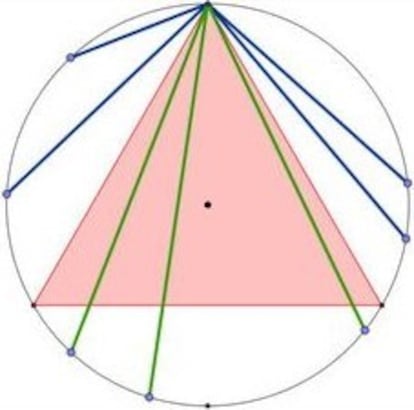Jean le Rond d'Alembert.
With his absurd procreative law, last week's macho king only managed to drastically reduce the number of his subjects, but the proportion of men and women remained the same.
Let us consider a sample of 100 couples who begin to procreate: among his firstborn there will be approximately 50 boys and 50 girls;
the parents of the latter will no longer be able to have more offspring;
but the other 50 couples, assuming they all continue to procreate, will have approximately 25 second-born boys and 25 girls, and so on, indefinitely?
No: in principle, only 12 or 13 pairs will have a third offspring, only 6 or 7 will have a fourth, only 3 or 4 will have a fifth, only 1 or 2 will have a sixth, and maybe none will have a seventh.
Each "consignment" of offspring will be half of the previous one (and soon the zero birth rate will be reached),
Despite its simplicity, the problem provoked a wide debate, in the framework of which Juan José Rodríguez brought up d'Alembert's criticisms of conventional probability theory, which, according to him, did not pay due attention to experience. in formulating their assumptions and their definitions.
Which, by the way, makes it more difficult to understand that the great French mathematician and encyclopedist erroneously estimated that the probability of getting at least one head when tossing two coins in the air is 2/3.
What is the true probability, and what misleading reasoning leads to the value 2/3?
Interestingly, this erroneous estimate is a clear example of the lack of attention to real situations that d'Alembert himself criticized.
An example of how complicated it can sometimes be to adequately formulate a probability problem can be found in Bertrand's paradox (I am not referring to his famous economic paradox related to Nash equilibrium, but to the probabilistic one, which we dealt with a while ago). some years):
What is the probability that a chord drawn at random in a circle is greater than the side of the equilateral triangle inscribed in it?
Depending on how the problem is approached, we can arrive at different answers: 1/2, 1/3, 1/4..., and I invite my astute readers to reconstruct the reasoning that can lead us to these or other values.
For example, which of the above estimates does the attached figure suggest and why?
The haggadah of the sweaty walkers
Oral tradition offers us numerous and instructive examples of erroneous, insufficient, misleading or implausible approaches.
Along these lines, a well-known haggadah (tale or fable with a moral of the Hebrew tradition) speaks of two walkers who -as a rabbi refers to his disciple- on a hot summer day are walking along a dusty path.
They finally find a source to quench their thirst.
One of the walkers' faces are dirty with sweat and dust, while the other's face is dry and clean.
Which of the two washes his face? asks the rabbi.
The naive answer is that the one whose face is dirty washes his face.
The ingenious answer is that the one who has it clean washes it, because each one sees the face of his partner and not his own, so the one who is clean believes that he is also dirty and vice versa.
But what would be the realistic answer, in the critical line of d'Alembert (and the rabbi of the Haggadah)?
Carlo Frabetti
is a writer and mathematician, member of the New York Academy of Sciences.
He has published more than 50 popular science works for adults, children and young people, including 'Damn Physics', 'Damn Mathematics' or 'The Great Game'.
He was a screenwriter for 'The Crystal Ball'.
You can follow
MATERIA
on
,
and
, or sign up here to receive
our weekly newsletter
.

